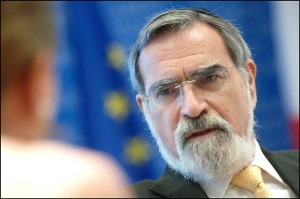Khaled Diab, ein bemerkenswerter arabischer Intellektueller ägyptischen Ursprungs, der lange in Brüssel gelebt hat und nun aus Jerusalem bloggt, hat ein Stück geschrieben, in dem er prophezeit, dass nur Juden und Araber, die sich selbst hassen, dem Nahen Osten Frieden bringen können.
Sein Blog ist lesenswert, ebenso die Kolumnen im Guardian (wie diese über die „arabische Mythen über die westliche Frau“ und die „westlichen Mythen über den arabischen Mann„).
In seinem Selbsthass-Stück heißt es:
Naturally, it goes without saying that, like any self-respecting ‘self-hater’, I don’t regard myself as such. Rather, I believe that many of the people who fire off accusations of self-loathing are usually self-righteous and cannot admit their side commits any wrongs. They tend to abide by the precept that it is ‘my side, right or wrong’ and that we shouldn’t ‘hang our dirty laundry’ out in public.
So, why do some people adopt such harsh tones against members of their group who express dissenting views, no matter how rationally or honestly expressed?
In general terms, not conforming to the mainstream view of your community carries with it the risk of ostracisation. More specifically, the concept of ‘self-hate’ seems to enjoy the most currency among groups, minorities and peoples who feel under attack, threatened marginalised or demonised and so feel that it is important for all members to pull rank.
In the Jewish context, the long and painful history of anti-Semitism and discrimination, not to mention pogroms and the Holocaust, as well as popular Arab hostility towards Israel, has bred a level of hyper-defensiveness in the minds of many.
This explains why the ‘self-hate’ label – which gained popular currency following Theodor Lessing’s 1930 book Der Jüdische Selbsthass (Jewish Self-hatred) – probably has a longer history among Jews than among other groups. It can also be particularly virulent, as illustrated by the toxic Jewish SHIT list of over 7,000 allegedly “Self-Hating and Israel-Threatening” Jews.
This sense of embattlement engenders the misguided belief in the mainstream of the Jewish psyche that Israel should be defended at any cost and regardless of its actions.
Similarly, though Arabs have not experienced anything as apocalyptic as the Holocaust, most of the Middle East lived through centuries of foreign domination (Greek and Hellenic, Roman and Byzantine, Persian, Arabian, Turkic and Ottoman, British and French, etc.) in which the locals more often than not lived as effective second-class citizens in their own countries, over-taxed, oppressed and largely excluded from the corridors of power.
So, when the promise of independence came around after the collapse of the Ottoman Empire, the fact that the Palestinians were the first Arabs to be denied their freedom has transformed the Palestinian question into one of the most emotive issues in the collective Arab conscience, leading many to view it with greater irrationality than most other issues. (…)
